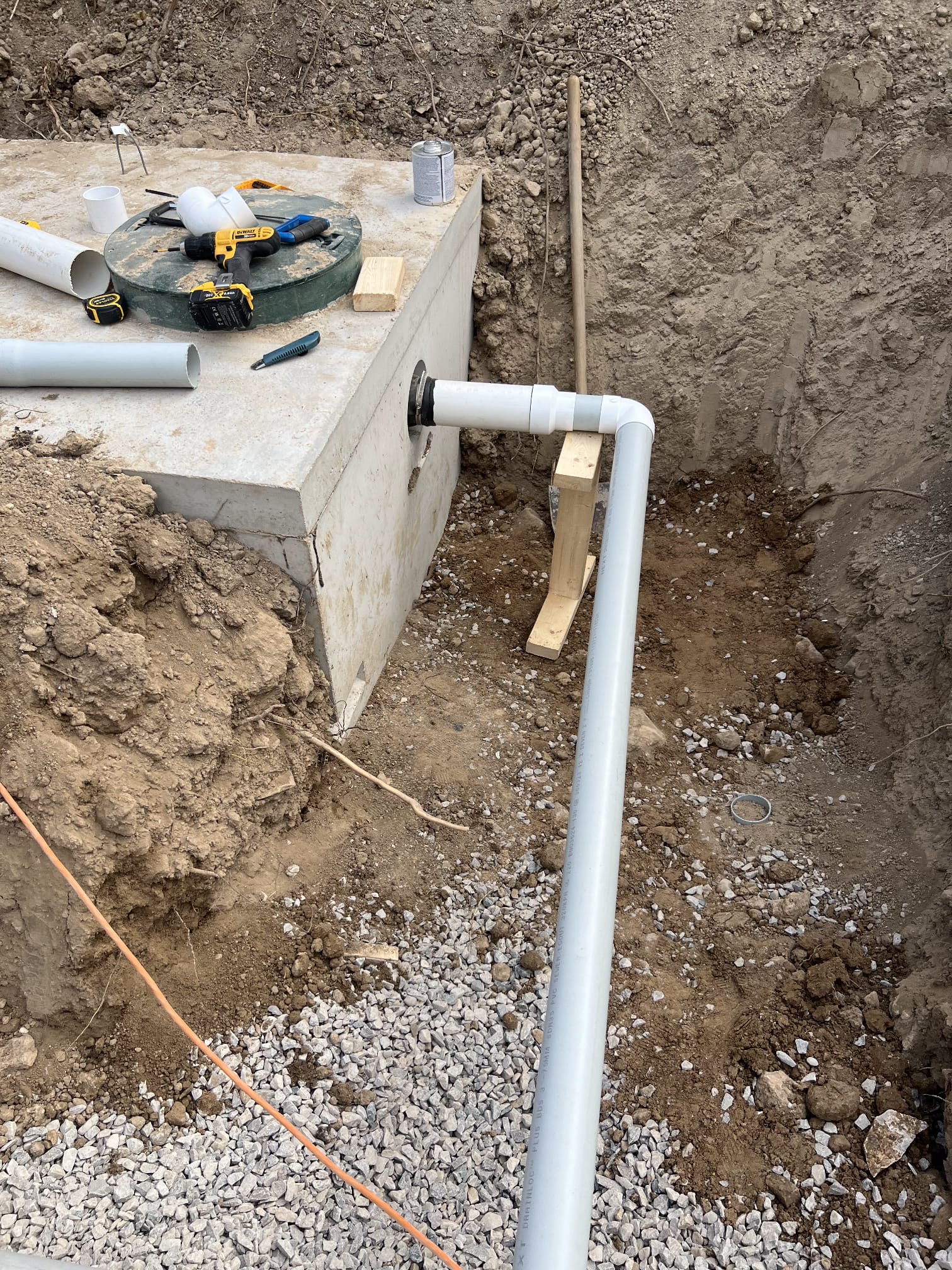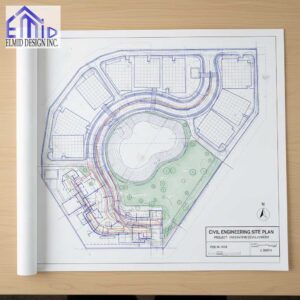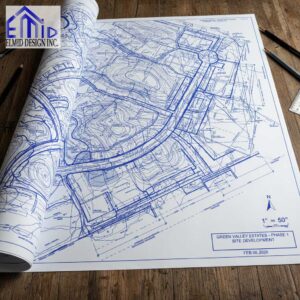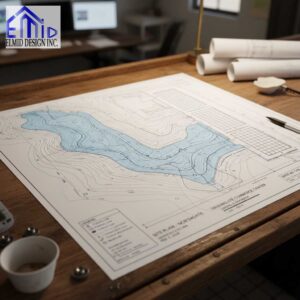If you plan to build or renovate a property in Brampton, understanding septic design is essential. While most urban areas connect to municipal sewer systems, some rural and semi-rural properties rely on private on-site wastewater treatment systems. A professional septic design Brampton plan ensures that wastewater from your home is collected, treated, and safely released into the ground without contaminating nearby soil or water sources. Engineers design these systems based on soil conditions, groundwater depth, and regulatory requirements. A well-prepared design protects both property value and environmental health. Partnering with experienced engineers, such as Elmid Design Inc., authorized by the Professional Engineers Ontario (PEO), ensures that your septic system is efficient, compliant, and built to last.
Understanding Septic Design in Brampton
A septic design Brampton project begins with analyzing the property’s natural conditions to determine how wastewater can be safely treated. Engineers evaluate soil type, groundwater level, and topography to design a system that operates effectively year-round. The design process involves specifying tank size, bed layout, and treatment components according to local regulations. A well-engineered design balances technical performance and environmental protection. Each property presents unique challenges, so custom engineering ensures that the system suits specific site characteristics. Proper septic design prevents health risks, reduces long-term costs, and ensures compliance with municipal and provincial standards.
Importance of Septic Design Brampton
In Brampton, septic design is more than a technical requirement; it is a commitment to protecting public health and the environment. Poorly designed systems can contaminate groundwater, damage ecosystems, and lead to expensive repairs. A properly engineered septic design ensures wastewater is treated naturally before reentering the soil. It also extends system lifespan and minimizes maintenance costs. By investing in a professional design, homeowners can meet legal standards, enhance property value, and contribute to sustainable water management. Reliable septic design Brampton systems support the city’s long-term goal of responsible growth and environmental preservation.
Local Regulations for Septic Design in Brampton
Septic systems in Brampton must comply with both the Ontario Building Code and local municipal regulations. These rules determine the system’s design, sizing, and installation process. Engineers prepare site-specific designs that include soil test data, design drawings, and permit applications for municipal review. The City of Brampton’s building department examines the plans to confirm compliance before issuing permits. Regulations also cover setback distances from wells, water bodies, and property lines to ensure safety. By following these rules, homeowners protect themselves from penalties and potential system failure. Working with licensed professionals ensures full regulatory compliance and smooth project approval.
The Role of Soil Testing in Septic Design Brampton
Soil testing forms the foundation of every septic design. Engineers perform tests to determine how quickly soil absorbs water and how deep the groundwater sits. This data helps select the right type of system for the site. For example, sandy soils provide good drainage, while clay soils may require raised filter beds or advanced treatment units. Soil testing also identifies seasonal changes that could affect system performance. In Brampton, accurate soil analysis ensures that septic systems operate efficiently, even during extreme weather conditions. This careful evaluation allows engineers to design systems that protect the environment and meet provincial standards.
Steps in the Septic Design Process
The process for septic design Brampton projects begins with an initial consultation. The engineer reviews the property layout, building plans, and expected water usage. Next, fieldwork begins with soil sampling and percolation testing. Based on these results, the engineer designs a detailed system layout that includes tank capacity, piping routes, and leaching area dimensions. The completed design package is submitted for municipal approval. Once approved, construction can proceed under professional supervision. This step-by-step approach ensures accuracy, efficiency, and long-term reliability. By following a structured design process, engineers create systems that function safely and meet every regulatory expectation.
Common System Types in Brampton
The type of septic system used in Brampton depends on soil and site conditions. Conventional gravity systems work best on properties with deep, well-draining soils. Raised filter bed systems are ideal for areas with shallow soil or high groundwater. In more challenging environments, advanced treatment units use aeration and filtration to improve wastewater quality. Engineers evaluate all factors to determine which system best fits the property. A properly selected design ensures efficient treatment, minimal maintenance, and long-term durability. Custom design solutions tailored to Brampton’s climate and soil variations deliver both performance and compliance.
Climate Considerations in Septic Design Brampton
Brampton’s climate significantly influences how septic systems are designed. The region experiences cold winters, spring thaws, and varying rainfall patterns. These conditions affect soil absorption and water table levels throughout the year. Engineers account for frost depth, slope stability, and drainage when developing the system layout. Proper insulation and trench depth prevent freezing, while carefully designed drainage maintains balance during heavy rains. Considering seasonal factors during design ensures the system performs efficiently year-round. Well-planned septic design Brampton projects remain functional, reliable, and environmentally safe regardless of changing weather conditions.
The Role of Engineers in the Design Process
Professional engineers play an essential role in creating effective septic system designs. They interpret site data, apply technical standards, and prepare documentation for municipal review. Engineers ensure that every design meets safety, environmental, and regulatory requirements. Their expertise prevents costly mistakes and reduces risks associated with system failure. Elmid Design Inc., authorized by the Professional Engineers Ontario (PEO), provides septic design services that combine engineering precision with practical field experience. Working with licensed professionals guarantees that your septic design Brampton project achieves high performance, compliance, and long-term reliability.
Environmental Impact and Sustainability
Environmental protection lies at the core of every septic design in Brampton. Engineers carefully design systems that prevent contamination of soil, groundwater, and nearby water bodies. They calculate absorption rates and design leaching beds that naturally filter wastewater. Environmentally responsible design supports Brampton’s sustainability goals by reducing pollution and conserving resources. Using efficient materials and advanced treatment technologies ensures that wastewater is purified before returning to the ground. A well-engineered septic design not only safeguards the environment but also strengthens community health and property value for years to come.
Advantages of Professional Septic Design Brampton
Choosing a professional engineer for septic design Brampton offers numerous benefits. Engineers ensure compliance with all municipal and provincial standards, reducing the risk of rejection or redesign. They calculate system capacity accurately and design layouts optimized for long-term performance. Professional oversight during design and approval ensures that the system meets safety and environmental goals. Elmid Design Inc. provides comprehensive design solutions tailored to Brampton’s diverse soil and terrain. Professional design guarantees reliability, reduces maintenance costs, and ensures your septic system remains efficient and compliant throughout its lifespan.
Why Brampton Property Owners Need Septic Expertise
Brampton’s growing population and expanding development have increased demand for professional septic design. Areas not connected to municipal sewers require systems that meet modern environmental and technical standards. Homeowners and developers must work with certified engineers who understand local conditions and regulations. Elmid Design Inc. specializes in providing septic designs that meet both municipal and environmental expectations. By combining engineering knowledge and practical experience, the company delivers solutions that protect water resources and property investments. Relying on professional expertise ensures safe wastewater management and sustainable property development in Brampton.
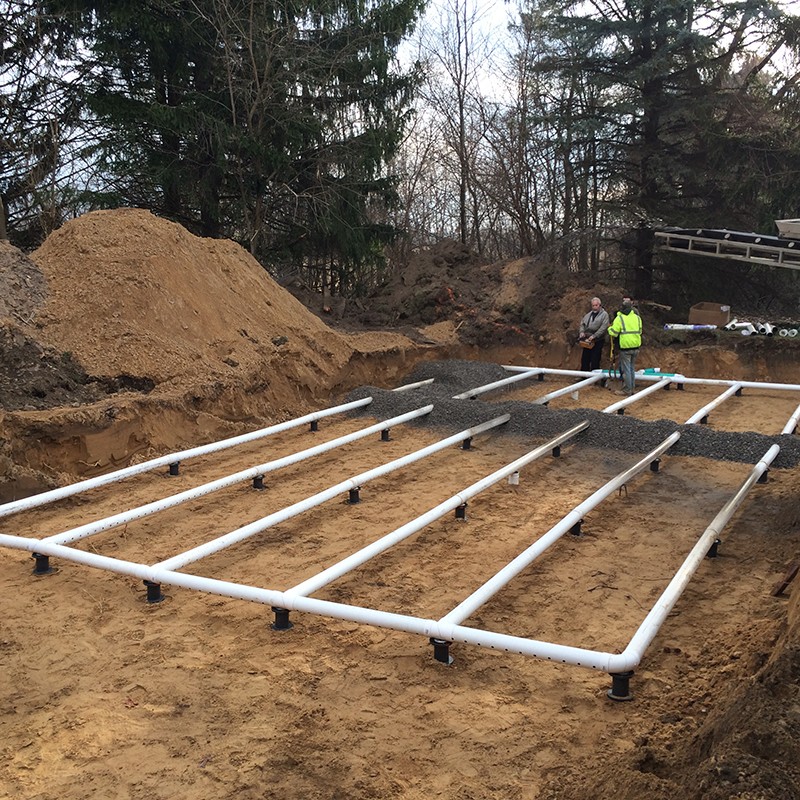
Cost Factors in Septic Design Brampton
The total cost of a septic design Brampton project depends on several key factors, including soil conditions, system type, and property layout. Sandy soils with good drainage often require simpler systems, while clay or rocky soils may need more advanced designs. The type of treatment technology also affects cost, as tertiary or advanced systems include additional components for enhanced filtration. Engineering design fees, permits, and inspections contribute to the overall budget. Although professional design may seem like an added expense, it prevents costly system failures and ensures compliance from the start. Investing in quality engineering pays off through reliability, longevity, and lower maintenance over time.
Permitting and Approval in Brampton
Before any septic system construction can begin, the design must receive approval from Brampton’s building department. Engineers prepare technical drawings, soil data, and supporting calculations that meet Ontario Building Code requirements. The municipality reviews each submission carefully to verify that it meets local environmental and safety standards. Once the design passes review, a permit is issued, allowing construction to start. Engineers maintain communication with municipal inspectors throughout this process to ensure accuracy and compliance. This structured approval process protects property owners from legal issues and ensures their system performs safely and effectively.
Installation Process for Septic Systems
After receiving municipal approval, the installation process begins under professional supervision. Contractors excavate trenches, place tanks, and install distribution pipes according to the approved design. The engineer checks slope alignment and verifies that each system component meets specifications. During construction, quality control is essential to prevent leaks, blockages, or uneven distribution. Engineers inspect the system at critical stages to confirm it matches the approved drawings. Once installation is complete, testing ensures proper wastewater flow and filtration. This level of oversight guarantees that every septic design Brampton project is completed safely and operates efficiently.
Advanced Treatment Systems in Brampton
In some cases, properties in Brampton require advanced treatment systems due to poor soil conditions or proximity to environmentally sensitive areas. These systems include aeration, filtration, and disinfection processes that improve wastewater quality before it reaches the ground. Engineers design each system to meet specific site requirements and environmental standards. Although advanced systems cost more initially, they allow development on challenging properties and provide better long-term performance. Elmid Design Inc., authorized by the Professional Engineers Ontario (PEO), specializes in designing advanced systems that combine efficiency, compliance, and environmental protection for residential and commercial projects in Brampton.
Environmental Impact and Groundwater Protection
Protecting the environment is a fundamental part of septic design Brampton projects. Engineers assess site characteristics, including slope and drainage, to minimize any risk of groundwater contamination. Proper design ensures wastewater is fully treated before reentering the soil. In regions near rivers or conservation lands, additional safety measures are included to protect sensitive areas. Sustainable materials and smart layouts enhance long-term safety and environmental performance. Elmid Design Inc. emphasizes eco-conscious engineering by integrating environmentally friendly techniques that reduce nutrient discharge and preserve Brampton’s water quality for future generations.
Maintenance and System Longevity
A septic system’s performance depends on consistent maintenance. Homeowners must schedule inspections and pumping at regular intervals to prevent overloading. Filters should be cleaned, and drainage areas must remain free of heavy equipment or structures. Engineers provide detailed maintenance plans suited to each property’s design and soil conditions. Following these recommendations ensures efficiency, safety, and compliance. Proper maintenance extends the lifespan of the system and reduces the likelihood of expensive repairs. For every septic design Brampton project, engineers emphasize preventive care as the best way to protect both property and environment.
Common Design Challenges in Brampton
Septic design in Brampton presents unique challenges due to variable soil types, changing elevations, and expanding urban boundaries. High groundwater levels and limited space in semi-rural lots often restrict system placement. Additionally, older neighborhoods may lack sufficient land area for traditional systems. Engineers address these challenges through customized design solutions such as raised beds or tertiary systems that optimize space while maintaining treatment quality. With a clear understanding of Brampton’s geography, Elmid Design Inc. creates systems that overcome design limitations while ensuring performance, durability, and full regulatory compliance.
Role of Professional Engineers in Compliance
Professional engineers play a vital role in maintaining compliance during both the design and installation stages. They interpret building codes, verify design calculations, and oversee construction to ensure accuracy. Licensed engineers take legal responsibility for system safety and functionality. Their involvement also facilitates communication with municipal authorities and environmental agencies. Elmid Design Inc. provides complete oversight, from initial soil testing to final approval, ensuring every project meets or exceeds regulatory requirements. Professional engineering involvement guarantees technical integrity, environmental protection, and long-term reliability for all septic design Brampton systems.
Benefits of Choosing a Certified Engineering Firm
Working with a certified engineering firm offers property owners confidence and peace of mind. Licensed firms follow provincial standards and employ professional engineers who understand both technical and local regulatory aspects. Elmid Design Inc., authorized by the Professional Engineers Ontario (PEO), combines design expertise, field experience, and environmental awareness to create systems that are efficient and durable. Their methodical approach ensures fast municipal approvals, reduced risk of failure, and optimal system performance. Choosing a certified firm adds long-term value to the property by ensuring safety, compliance, and sustainable functionality.
Long-Term Value of Professional Design
A professionally engineered septic design in Brampton offers lasting financial and environmental benefits. While cheaper alternatives may appear appealing, they often lead to early system failure or costly upgrades. A professional design ensures proper system sizing, correct materials, and adherence to all environmental regulations. These factors contribute to lower maintenance expenses and greater property value. Elmid Design Inc. ensures every project is built to last, providing homeowners with an engineered solution that balances cost, performance, and sustainability. Professional engineering remains the key to long-term success for all septic systems in Brampton.
Homeowner Responsibilities After Installation
Once the septic design Brampton system is installed and approved, the homeowner becomes responsible for its operation and maintenance. Regular care ensures the system performs efficiently and remains compliant with local standards. Homeowners should monitor water usage, schedule routine inspections, and avoid flushing materials that harm the system. Following the maintenance plan provided by the engineer keeps the septic components functioning properly and prevents premature failure. Responsible ownership extends the lifespan of the system and protects both the property and the environment from contamination.
Identifying Signs of System Trouble
Even the best-engineered septic system can experience issues over time. Slow drains, sewage odors, or damp areas near the leaching bed often indicate blockages or hydraulic overload. These early warning signs should never be ignored. Contacting a qualified engineer or technician ensures the issue is diagnosed accurately and resolved quickly. Timely intervention prevents expensive repairs and environmental damage. By recognizing and addressing potential problems early, homeowners maintain system efficiency and ensure continued compliance with Brampton’s health and environmental regulations.
Importance of Regular Inspections
Routine inspections are essential for maintaining the performance and safety of any septic design Brampton system. Engineers recommend annual evaluations to check tank conditions, filter performance, and flow balance. These inspections help detect early signs of deterioration, leaks, or structural concerns before they escalate. Proper record-keeping also demonstrates compliance during property sales or municipal reviews. Elmid Design Inc. provides professional inspection and reporting services to help homeowners stay compliant and maintain efficient system performance throughout the year. Regular professional oversight guarantees reliability and peace of mind.
Upgrading Older Systems in Brampton
Many older homes in Brampton still rely on outdated septic systems that no longer meet current environmental or efficiency standards. Upgrading these systems enhances wastewater treatment and aligns them with modern regulations. Engineers assess the condition of existing tanks and beds, then design improvements such as advanced filtration or aeration units. These upgrades extend system life and reduce maintenance needs. Elmid Design Inc. specializes in evaluating and modernizing aging systems with environmentally sustainable solutions. Upgrading ensures compliance, improves efficiency, and protects the city’s natural water resources from contamination.
Sustainable Design and Environmental Awareness
Sustainability plays a vital role in every septic design Brampton project. Engineers integrate environmentally conscious practices such as optimizing soil absorption, minimizing excavation impact, and using durable, recyclable materials. Homeowners can support these goals by conserving water and maintaining their systems responsibly. Sustainable design reduces pollution and preserves groundwater quality across Brampton. Elmid Design Inc. emphasizes green engineering principles that promote long-term environmental protection while ensuring effective wastewater treatment. Through combined efforts between engineers and homeowners, sustainable development becomes a lasting reality.
Technological Advancements in Septic Systems
Modern septic design Brampton projects benefit from continuous innovation in wastewater technology. Engineers now implement smart monitoring systems that track water levels, detect leaks, and alert homeowners to maintenance needs. These advancements improve efficiency and reduce system downtime. New treatment technologies also enhance purification, making systems cleaner and more reliable. Elmid Design Inc. remains at the forefront of these innovations, integrating advanced designs and materials to meet evolving environmental and performance standards. Embracing technology ensures every system remains efficient, sustainable, and compliant for years to come.
Environmental Protection and Community Impact
A properly designed and maintained septic system protects not only the individual property but also the surrounding community. Septic design Brampton projects aim to safeguard soil, groundwater, and nearby ecosystems. Clean water and safe waste treatment benefit public health and support sustainable urban growth. Engineers work closely with municipal authorities to ensure every system meets safety regulations and environmental targets. Elmid Design Inc. prioritizes ecological balance by designing systems that treat wastewater thoroughly and protect the natural environment for future generations.
The Future of Septic Design Brampton
The future of septic design Brampton will continue to focus on sustainability, innovation, and community awareness. As urban development expands, engineers will design systems that adapt to smaller spaces and stricter environmental regulations. Modern materials and digital monitoring will make systems more efficient and easier to maintain. Elmid Design Inc. continues to lead this evolution by combining engineering excellence with forward-thinking design strategies. The future of wastewater management in Brampton lies in smarter, cleaner, and more environmentally conscious septic design solutions.
Frequently Asked Questions About Septic Design Brampton
What is included in a septic design Brampton project?
A septic design Brampton project includes site evaluation, soil testing, system sizing, and complete engineering drawings prepared for municipal approval.
How long does it take to get septic design approval in Brampton?
Approval timelines depend on municipal workload and design complexity. However, professionally prepared designs usually receive approval within a few weeks.
Who can design septic systems in Brampton?
Only licensed designers or professional engineers authorized by the Professional Engineers Ontario (PEO) can prepare septic system designs that meet the Ontario Building Code.
What factors affect septic system cost in Brampton?
Costs vary depending on soil type, lot size, groundwater depth, and system type. Advanced treatment systems typically cost more but provide superior efficiency.
How often should a septic system be inspected or pumped?
Septic systems should be inspected annually and pumped every three to five years, depending on system size and household usage.
Can older septic systems be repaired or upgraded?
Yes, many older systems can be upgraded with advanced filtration or aeration units to meet current environmental and performance standards.
Why is professional engineering important for septic design Brampton?
Professional engineers ensure that the system meets all safety, technical, and environmental regulations. They also oversee the process from design to final approval.
Why choose Elmid Design Inc. for septic design Brampton?
Elmid Design Inc. combines professional engineering expertise, local knowledge, and environmental awareness to create efficient, code-compliant, and sustainable septic systems for Brampton homeowners.

Leading Engineering Experts for Septic Design Brampton
Elmid Design Inc. delivers professional engineering services for septic design Brampton projects with precision, sustainability, and reliability. As a firm authorized by the Professional Engineers Ontario (PEO), it provides code-compliant septic system designs tailored to Brampton’s diverse soil and environmental conditions. The company’s experienced engineers combine technical expertise with practical insight to create efficient, durable, and environmentally responsible solutions. Through a commitment to quality, safety, and innovation, Elmid Design Inc. continues to be a trusted name for homeowners and developers seeking dependable septic engineering services across Brampton.
Geographic Locations That We Service:
Our Licensed Professional Engineers specializing in Engineered Site Grading Plans offer the best-engineered site grading plan, lot grading and erosion plan, and drainage plan to obtain site plan approval and building permits in Ontario, including a wide range of municipalities. Each area boasts unique features and requirements, making our tailored approach essential for success.
Toronto and Surrounding Areas
In the vibrant heart of Ontario, we service Toronto (City of Toronto) and surrounding areas. Additionally, we cover Oshawa (City of Oshawa), Pickering (City of Pickering), and Clarington (Municipality of Clarington). Furthermore, our expertise extends to Ajax (Town of Ajax), Whitby (Town of Whitby), Brock (Township of Brock), Scugog (Township of Scugog and Uxbridge (Township of Uxbridge).
Halton Region
Moving to the Halton Region, our services encompass Burlington (City of Burlington) and Halton Hills (Town of Halton Hills). Also included are Milton (Town of Milton) and Oakville (Town of Oakville).
Peel Region
In the Peel Region, we provide services in Brampton (City of Brampton), Mississauga (City of Mississauga), and Caledon (Town of Caledon).
York Region
Our services in the York Region cover Vaughan (City of Vaughan), Aurora (Town of Aurora), and East Gwillimbury (Town of East Gwillimbury). We also cater to Georgina (Town of Georgina), Markham (City of Markham), Newmarket (Town of Newmarket), Richmond Hill (City of Richmond Hill), Whitchurch-Stouffville (Town of Whitchurch-Stouffville), King (Township of King), and Bradford-West Gwillimbury (Town of Bradford-West Gwillimbury). Each municipality here offers a distinct setting, requiring our specialized approach.
Other Southern Ontario Cities and Towns
We also serve many other cities and towns in Southern Ontario. These include Hamilton (City of Hamilton), St. Catharines (City of St. Catharines), Niagara on the Lake (Town of Niagara on the Lake), Brant (County of Brant), Cambridge (City of Cambridge), Kitchener (City of Kitchener), Waterloo (City of Waterloo), and Woodstock (City of Woodstock). Furthermore, we operate in Guelph (City of Guelph), Centre Wellington (Township of Centre Wellington), Shelburne (Town of Shelburne), Orangeville (Town of Orangeville), New Tecumseth (Town of New Tecumseth), Essa (Town of Essa), Collingwood (Town of Collingwood), Wasaga Beach (Town of Wasaga Beach), Barrie (City of Barrie), Midland (Town of Midland), Orillia (City of Orillia), Ramara (Town of Ramara), Minden Hills (Town of Minden Hills), North Kawartha (Town of North Kawartha), Kawartha Lakes (City of Kawartha Lakes), Peterborough (City of Peterborough), Selwyn (Town of Selwyn), and Brighton (Municipality of Brighton).

